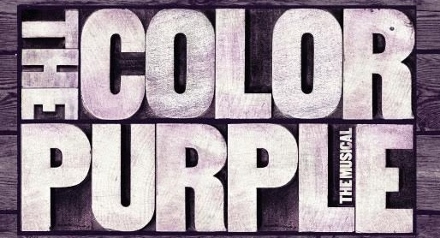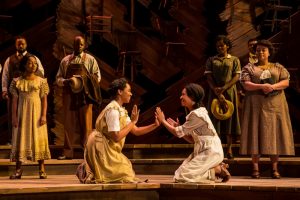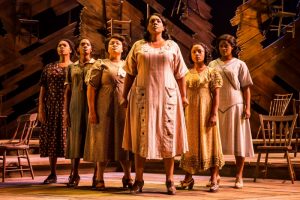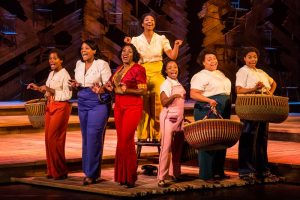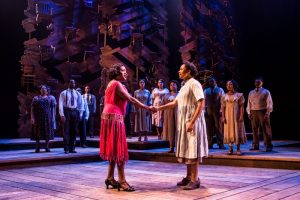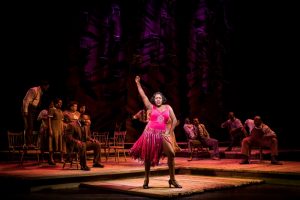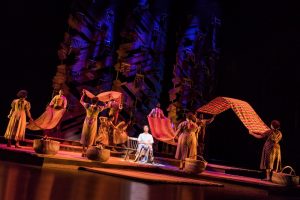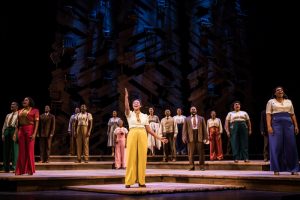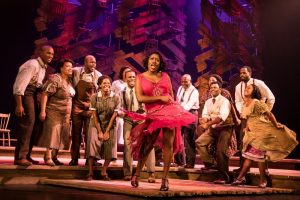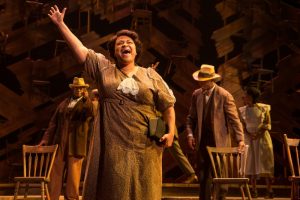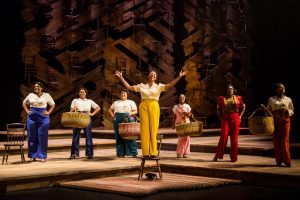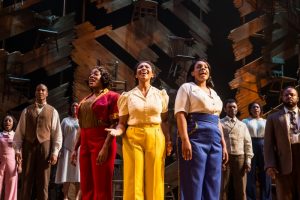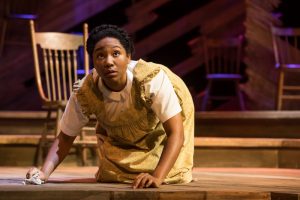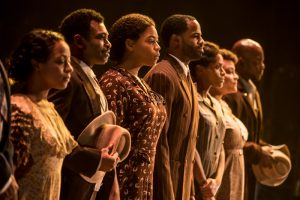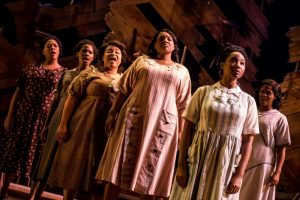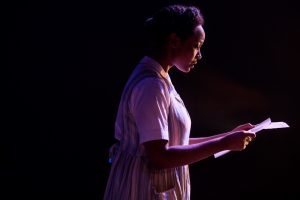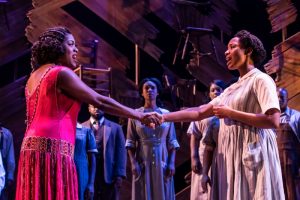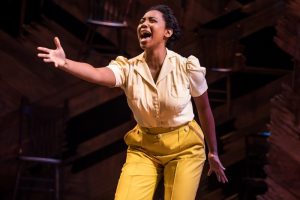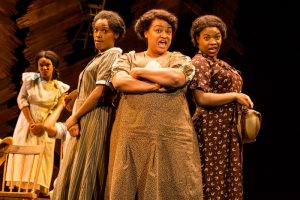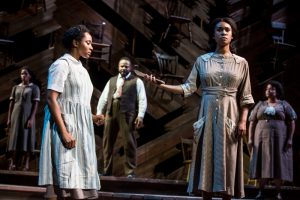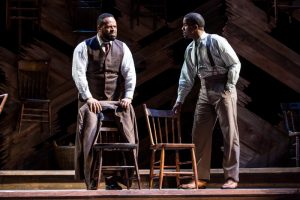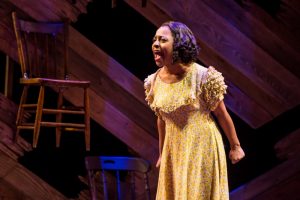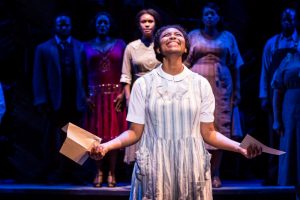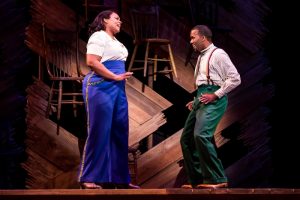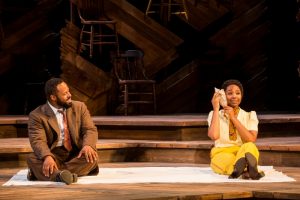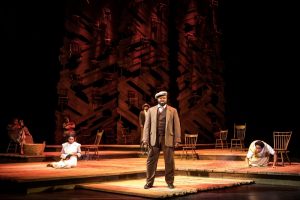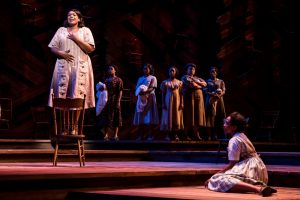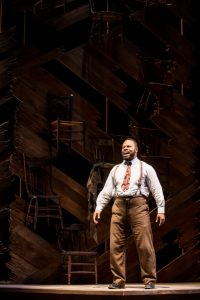WHILE HARDLY REVELATIONAL,
A REVVED-UP REVIVAL BECOMES RELATABLE
It’s a miracle. After seeing the original 2005 musical adaption, it seemed that nothing could fix this show. But then The Color Purple met director John Doyle, who made a name for himself by reinventing musicals by eliminating choruses and having actors often playing instruments in lieu of an orchestra, most notably in the Stephen Sondheim perfections Company and Sweeney Todd. With eagle-eye editing and intricate intimacy, he found the beating heart of an amazing tale — without having actors play instruments (but boy oh boy do they move a lot of chairs). Doyle’s 2015 revival, which began in 2013 at London’s 180-seat Menier Chocolate Factory, closed on Broadway after two years at the 1,001-seat Bernard P. Jacobs Theatre, and is now residing at the 2,703-seat Hollywood Pantages as part of a North American tour.
Alice Walker’s epistolary, symbol-filled, Dickensian and controversial novel The Color Purple is a dark and honest look at the cycle of slavery in the black community: a slave-born father abuses his free son – referred to as Mister – who in turn enslaves and batters Celie, a woman in rural Georgia who remains silent to her situation; meanwhile, her missionary sister Nettie escapes the South’s indignities only to be confronted in Africa by a village’s black hierarchy and the black-on-black violence which is beset upon them by white corporations.
With grace and humor, Walker’s captivating, well-drawn characters struggle with issues of self-respect and self-expression (including lesbianism). Celie is motivated by the free-thinking women in her sphere (the strong-willed Sophia and a talented and beautiful jazz singer named Shug), ultimately experiencing a freedom that the Emancipation Proclamation alone could not grant her.
The somewhat neat and tidy ending (not unlike Dickens’ Nicholas Nickleby), is thoroughly satisfying because Walker first thoroughly and harshly presents a disturbing picture of abusive men (hence, the novel’s controversy); what begins as brutal circumstances for the female characters – rape, domestic violence, servitude – ends as a feminist celebration and we are inspired by the resilience of the human spirit.
It’s a damn good story packed with colorful characters, more than worthy of adaptation, as was evident in the gratifying sentimentality of Steven Spielberg’s lush 1985 film version. (Oprah, who received an Academy Award nomination for her portrayal of Sophia, is a major backer of the musical.) While Spielberg’s brand of Americana didn’t always coincide with Walker’s drab vision, he nonetheless managed to balance some of the screenplay’s improbabilities with his ravishing style and stirring sensibility.
But the 2005 musicalization was a mess (which didn’t keep it from being a boffo hit). Instead of evocative storytelling and detail, Marsha Norman, who penned an equally stultifying book for The Secret Garden (1991), offered snippets of the novel’s best moments, as if we are watching Stereopticon Slides of someone else’s adventure. Tremendously important pieces of information were hurled at us with the speed of a Tennessee tornado, ensuring that very few moments actually landed. The dispiriting libretto actually skirted and softened the upsetting cheerlessness of Walker’s novel.
The three pop-hit song writers who – between them – had never written a musical were and still are Brenda Russell, Stephen Bray and Allee Willis. No wonder many of the songs still sound mostly like eighties R&B: their credits list nothing but top-ten songs for recording stars (Willis, who wrote the infectious theme from Friends, was one of six writers on the disastrous jukebox musical Hot Feet). Their eclectic styles jump about, caught up in the same twister as the story: African rhythms, blues, and forgettable attempts at pop ballads don’t all land with a thud as before, but great standalone numbers are few in this 155-minute triumph of the will. The curtailed and choppy songs no longer interrupt the narrative’s flow; Doyle’s genius is such that we are emotionally involved to the point that we forgive this rather innocuous score (forgive and forget for me).
Doyle’s stripped-down sensibility satisfyingly sets Celie’s suffering and celebration at the forefront by synthesizing story and song in a flowing manner. Far from being a fast-moving Broadway machine, some scenes actually have a stage of actors standing in place for long stretches of time. (This must have been spectacular in a small house; on the road, the show — and the sound — get swallowed up far too many times.) Doyle’s set is basically wooden-planked risers that represent the area’s hardscrabble homes and churches, with a giant upstage wall adorned with straight-backed wooden chairs used for everything from farming implements to tables (Jane Cox’s lighting design has as much character as the ebullient cast).
Adrianna Hicks plays the central figure of Celie with warmth, vulnerability and power; she knocks her eleven o’clock number (“I’m Here”) out of the park with a burst that could easily symbolize the #MeToo movement. This is why it’s such a shame that many of her tunes sound more like recitative than actual songs (do I ever miss real songs in Broadway shows).
Carrie Compere wrings every bit of humor and pathos imaginable out of the stalwart character of Sophia, who takes a pre-feminist era stance against the opprobrious, bullying men of the Deep South, making her “Hell No!” a rousing anthem for millennia of abused and silenced women; however, “Any Little Thing,” her second act duet with husband Harpo (J. Daughtry) is the kind of mindless tune that sorely needs Irving Berlin. Still, Doyle’s musical staging of the big-bodied Compere being bounced by Daughtry is hilarious.
Carla R. Stuart is so vividly scrumptious as the speakeasy chanteuse Shug Avery that you may have to control yourself from hopping into her bubble bath. It’s no wonder that she arouses lesbian desire and true love in Celie. It’s a shame that Shug’s blues number, “Push Da Button,” doesn’t have the kind of racy double-meaning risqué lyrics that Fats Waller’s frequent collaborator Andy Razaf would write.
Erica Durham is joyously hysterical as the simple-minded Squeak, Gavin Gregory grumbles and rumbles as mean ol’ Ol’ Mister, and N’Jameh Camara is regal and lovely as Nettie.
It’s also amazing that the story resonates given the musical’s time-span of 40 years. The Color Purple remains a problematic show on paper; this production all but smooths out the wrinkles.
The Color Purple
national tour
at the Hollywood Pantages Theatre
until June 17, 2018
for tickets, call 800-982-2787
or visit Hollywood Pantages Theatre
tour continues through 2018
for dates and cities, visit Color Purple
